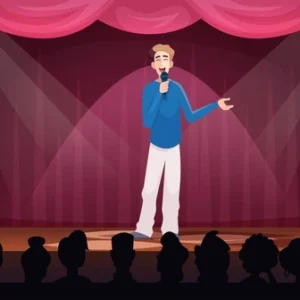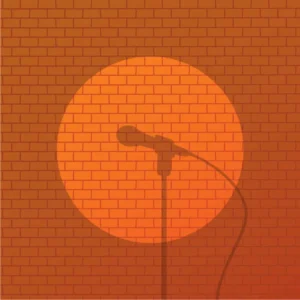A dream becomes something real when you give it a deadline—it turns into a goal.
When you break that goal into smaller, manageable pieces, you now have a plan.
And once you act on that plan? That’s when dreams start transforming into reality.
But here’s the flip side: a dream with no goals and no plan? That’s just a setup for regret.
Yeah, I know—this probably sounds like something printed on a motivational mug or stuck to a breakroom wall under fluorescent lights.
Office life? Bleh. I get it.
Still, it’s surprising how often creative people—especially in the arts—don’t take the time to write down what they actually want.
So many of us live in this “someday” mindset. We wait for opportunities to find us instead of carving out a path toward them. Writers, actors, comedians… we’re some of the most vulnerable to this trap.
Why? Because too many people are passively hoping for success instead of deliberately planning for it.
Take a look at more traditional careers. If you want to become a lawyer, there’s a roadmap. College. Law school. Counseling sessions to help you navigate which classes you need. You complete a set number of units, maybe intern at a firm, and—if all goes well—they might even hire you.
Then comes the bar exam. You know what to study, how many questions will be on it, what percentage you need to pass. And after all that? Boom—you’re a lawyer. You have credentials. A job. A paycheck.
Now compare that to showbiz. There’s no official syllabus. No required classes. No certification. No test score to hit. You don’t earn a diploma saying, “Congratulations, you are now a professional comedian!”
So how do you build a career in the creative world?
If you’re an actor, maybe you’re attending workshops, doing showcases, trying to get signed by an agent who’ll send you out on auditions. You’re learning, hustling, hoping to land something.
Now if you’re a comedian or comedy writer, it’s pretty similar—but with even less structure. The responsibility to get good at your craft? That falls on you.
There’s no checklist. No curriculum. No guarantee.
But there is a silver lining: you don’t need to spend four years in a university or rack up student loans. You just need to be great at what you do.
And how do you get great?
There are two main paths:
- Hit the stage again and again, figuring it out as you go.
- Get guidance. Take classes. Work with someone who knows the ropes, can point out your blind spots, and help you grow faster, safer, and smarter.
I’ve tried both. And believe me, working with an experienced coach or mentor saves a lot of time and frustration.
Open mic after open mic can help, sure—but I’ve seen too many comedians do the exact same material every week, and it still doesn’t land. No adjustments, no changes. Just the same failed punchline over and over again.
Sound familiar?
Einstein supposedly said the definition of insanity is doing the same thing repeatedly while expecting different results. Whether or not he actually said it, the point still hits hard.
Legendary coach John Wooden once put it this way: “Practice doesn’t make perfect. Perfect practice makes perfect.”
That’s the difference a great teacher can make. Someone who understands joke structure, timing, and delivery can spot the missing piece that turns a “funny idea” into a full-fledged, laugh-out-loud joke.
Here’s a real-life example from one of my students:
She got on stage and said:
“I’m in menopause and I’ve been getting these terrible hot flashes lately. I mean they’re bad. Last night, we were home, the kids are asleep and I got this awful hot flash. I was burning up. So I just peeled off all my clothes. I swear I almost gave my husband a heart attack. Thank God we weren’t at Starbucks.”
Now, it’s a humorous idea. But structurally? It needed some tweaking.
Comedy thrives on surprise. That’s a core trigger for laughter. So we reworked the setup to leave out “we were home,” which helped create a misleading assumption and set the audience up for a better punchline.
The revised version:
“I’m in menopause and I’ve been getting these terrible hot flashes lately. I mean they’re bad. Last night, the kids are asleep and I got this awful hot flash. I was burning up. So I just peeled off all my clothes. I swear I almost gave my husband a heart attack…
‘Cause we were at Starbucks.”
Boom—surprise! The setup made you think she was home, and the punchline flips that expectation.
Even better? Once the student understood the principle, she added her own tags:
“(Shrugs) The coffee wasn’t the only thing that was hot…”
“Then I took my husband’s coffee cake and asked, ‘Want me to heat that up for you?’”
Three jokes from one premise. All because she understood the core mechanics of what makes people laugh—and how to shape her idea into something stronger.
So yes, trial-and-error has its place. But repetition without reflection is a trap. You won’t grow if you’re not evolving.
The New Year’s coming fast.
You’ve got a dream? Great.
Now set real goals.
Make a solid plan.
Take consistent action.
And step into your success—on your terms.










